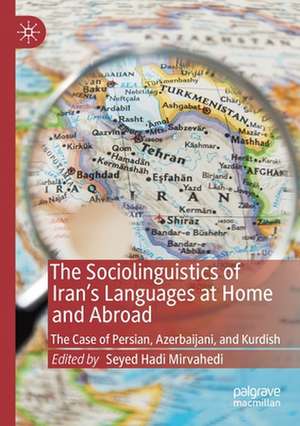The Sociolinguistics of Iran’s Languages at Home and Abroad: The Case of Persian, Azerbaijani, and Kurdish
Editat de Seyed Hadi Mirvahedien Limba Engleză Paperback – 14 aug 2020
| Toate formatele și edițiile | Preț | Express |
|---|---|---|
| Paperback (1) | 583.78 lei 43-57 zile | |
| Springer International Publishing – 14 aug 2020 | 583.78 lei 43-57 zile | |
| Hardback (1) | 784.92 lei 43-57 zile | |
| Springer International Publishing – 10 iul 2019 | 784.92 lei 43-57 zile |
Preț: 583.78 lei
Preț vechi: 686.79 lei
-15% Nou
Puncte Express: 876
Preț estimativ în valută:
111.70€ • 116.94$ • 92.43£
111.70€ • 116.94$ • 92.43£
Carte tipărită la comandă
Livrare economică 07-21 aprilie
Preluare comenzi: 021 569.72.76
Specificații
ISBN-13: 9783030196073
ISBN-10: 3030196070
Pagini: 294
Ilustrații: XVII, 294 p. 30 illus., 8 illus. in color.
Dimensiuni: 148 x 210 mm
Greutate: 0.41 kg
Ediția:1st ed. 2019
Editura: Springer International Publishing
Colecția Palgrave Macmillan
Locul publicării:Cham, Switzerland
ISBN-10: 3030196070
Pagini: 294
Ilustrații: XVII, 294 p. 30 illus., 8 illus. in color.
Dimensiuni: 148 x 210 mm
Greutate: 0.41 kg
Ediția:1st ed. 2019
Editura: Springer International Publishing
Colecția Palgrave Macmillan
Locul publicării:Cham, Switzerland
Cuprins
Chapter 1: Nationalism, modernity and the issue of linguistic diversity in Iran (Seyed Hadi Mirvahedi).- Part I: The politics of ethnolinguistic diversity in Iran.- Chapter 2: Exploring Azerbaijani speaking parents' linguistic practices and ideologies in Ardebil, Iran (Rasoul Jafari).- Chapter 3: Linguistic landscaping in Tabriz, Iran: A discursive transformation of a bilingual space into a monolingual place (Seyed Hadi Mirvahedi).- Chapter 4: Attitudes toward Kurdish in the city of Ilam in Iran (Saeed Rezaei & Ava Bahrami).- Part II: Iranians abroad: Heritage language use and maintenance.- Chapter 5: Family Language Policy towards Heritage Language Literacy Acquisition and Maintenance: Iranians in New Zealand (Khadijeh Gharibi & Corrine Seals).- Chapter 6: Mother tongue matters: An ethnographic study of cross-generational voices in negotiation in Farsi mother tongue classes (Narges Ghandchi).- Chapter 7: ‘Are these ones to taste?’: Critical Moments in Persian shops in Sydney(Dariush Izadi).- Part III: Transnational identities and mobility: The role of Persian, ethnic languages, and English.- Chapter 8: Language barrier and internal conflict among Iranian migrants in Australia: A case of unsettling tension (Hossein Shokouhi & Alireza Fard Kashani).- Chapter 9: Investigating Multilingual Identities and Ideologies among Iranian Communities in Contexts of Mobility (Taraneh Sanei).- Chapter 10: Mobility, Identity, and Complexity: Iranian Azerbaijanis in the U.S. (Farzad Karimzad).- Chapter 11: Iranians at home and abroad: Current sociolinguistic issues, possible solutions, and future trajectories (Seyed Hadi Mirvahedi).
Notă biografică
Seyed Hadi Mirvahedi is a Postdoctoral Fellow in Linguistics and Multilingual Studies at Nanyang Technological University, Singapore. Prior to taking up his fellowship at Nanyang Technological University, he completed his PhD at Victoria University of Wellington, New Zealand.
Textul de pe ultima copertă
This book examines the sociolinguistics of some of Iran’s languages at home and in the diaspora. The first part of the book examines the politics of minority languages and the presence of hegemonic discourses which favour Persian (Farsi) in Iran, exploring issues such as language maintenance and shift, linguistic ideologies and practices among Azerbaijani and Kurdish-speaking communities. The authors then go on to examine Iranians’ linguistic ideologies, practices and (trans)national identity construction in the diaspora, investigating both the challenges of maintaining a home language and the strategies and linguistic repertoires employed when constructing a diasporic identity away from home. This book will be of interest to students and scholars of minority languages and communities, diaspora and migration studies, and language policy and planning.
Seyed Hadi Mirvahedi is a Postdoctoral Fellow in Linguistics and Multilingual Studies at Nanyang Technological University, Singapore. Prior to taking up his fellowship at Nanyang Technological University, he completed his PhD at Victoria University of Wellington, New Zealand.
Seyed Hadi Mirvahedi is a Postdoctoral Fellow in Linguistics and Multilingual Studies at Nanyang Technological University, Singapore. Prior to taking up his fellowship at Nanyang Technological University, he completed his PhD at Victoria University of Wellington, New Zealand.
Caracteristici
Uses a range of research tools to explore linguistic practices Links micro-analyses to macro-level developments in Iran and countries hosting Iranian communities Contributes to the limited literature on linguistic ideologies in Iranian communities around the world
